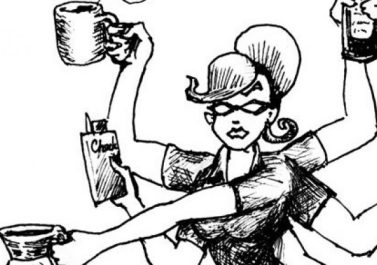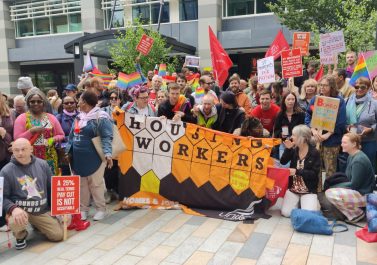‘The More We’re Together’ – East London strike
Tower Hamlets Council workers will strike on Friday, 3 July, resisting the imposition of sweeping new ‘sack-and-rehire’ contracts.
Let’s Get Rooted will be joining picket lines and keeping up to speed with comrades involved in the strike. We want to find out more about what’s led up to workers acting, what they hope and expect to achieve, what they feel it might cost them if the strikes don’t work – and most of all, what possibilities they see to strengthen their hand and overcome divisions. We’ll also see what might be done to link this dispute and future fights to the working class in the local area.
It’s organised by UNISON, and is the first of three one day actions, with the possibility of further strikes. You can read more about the details of the council’s demands here:
https://towerhamlets.unison.site/2020/06/19/tower-rewards-why-were-striking-faqs/
We think this is a particularly important and significant strike for a few reasons – in no particular order:
• Timing. It’s perhaps the first large-scale strike since the COVID regime came down in March, and will therefore be a test of workers’ appetite for close collaboration and collective action. In fact, it’s the end of a phase of ‘phoney war’. The original strike ballot was in January – UNISON suspended the threat of strike action for the duration of the COVID crisis, to which the council responded by delaying imposition of the new contracts. This dance of peace was broken when the council announced the new contracts would be enforced on 6th July. So is the crisis over? Well no, apparently – the council has accused the workers of irresponsibility for going out in the middle of a pandemic!
• Who’s involved. The 4,000 or so staff affected by the new (and mainly worse) contracts range from school kitchen staff to childrens’ services and social workers, benefits office staff and environmental officers – those ‘essential’ and ‘key’ workers who were apparently going to be properly appreciated and valued in future, when the epidemic in London was at its height and everyone loved them. And in the midst of the outbreak of public ‘wokeness’ among the political class and bureaucracy provoked by the Black Lives Matter campaign, it’s noted that the majority of workers who will be worst affected by the new contracts are exactly the lowest paid, mainly ethnic minority, and female.
• Divide and rule. The new contracts are comprehensive, but they don’t affect all workers equally, and in some cases may lead to higher pay – usually for the already better paid. The council argues is that it needs to cut employment and pensions costs for most groups so that they can improve conditions for hard-to-recruit people like social workers. This will test the level of solidarity between different worker groups across the council and mean that the most highly engaged and motivated workers may need to find new ways of breaking down the silos of communication and narrow group self-interest. We hear that kitchen workers, for example, have been repeatedly phoned by managers checking that they won’t go on strike, and threatening them with the sack if they do.
• The strategy. The council has taken a ‘big bang’, fire-and-rehire approach from a playbook more familiar to workers for private sector companies – which suggests either great confidence, or desperation. For instance, small annual increments in pay, determined by a public sector pay scale called ‘the spine’, have up till now been automatic – but under the new contracts would be tied to a favourable performance review by a line manager. Lumped in with this are things like sharp reductions to pension benefits, an 80% cut in redundancy terms. So it’s an immediate cost-cutting exercise that also includes measures to individualise and remould the management-worker relationship for the long term.
• Labour councils implementing central government cuts and policy. This is nothing new: local authorities in the UK have been enforcing centrally-hatched measures on their local populations for at least 100 years, irrespective of their political colour. Sometimes it’s over rent levels, sometimes housing policy itself, sometimes – as in the last 10 years – councils hacking away at library provision, sports halls or local parks. Labour councillors have from time to time mounted heroic, and usually doomed, shows of resistance; Liverpool and Clay Cross in the 1970s, when councillors went to jail, and Tower Hamlets itself in the 1930s. The biggest element of councils’ income is still from central government, and this money has been cut so much since 2010 that many UK councils are now on the verge of bankruptcy. Tower Hamlets financial statements for 2018-19 blandly report that in the next 3 years, “a number of external challenges, including the government welfare reforms, local government funding levels and Brexit, will pose additional risks to the council” – which had a mere £2m of spendable reserves at the end of the year, although it did report an additional £287m of mysterious ‘unusable reserves’. Tower Hamlets is by no means alone in looking for cuts at the expense of its workers: for instance Croydon council has just announced 500 job cuts – around 15% of the workforce. In the long run, councillors and council officers will always be mindful of their legal duties, and the penalties they might bring on their own heads for not running a tight financial ship. We know that the few occasions when blatantly exploitative or unfair measures got overturned, at least temporarily, were when there was a powerful and unified grass roots working class response, – such as the domestic rates strikes in the 1920s and the Poll Tax Rebellions in the 90s.
• The place. Tower Hamlets features regularly in league tables of inequality: for instance, it’s been second only to Westminster for average wages, despite being an overwhelmingly working class district. That’s explained by the huge salaries earned in the financial hub of Canary Wharf – their luxury boat lifts us all up! So how can we be second only to Knowsley for multiple indications of deprivation like overcrowding, malnutrition, poor general health, short lifespans and low levels of literacy? Dunno guv, must be something to do with the class system. At any rate, Tower Hamlets was and still is the landing place and home to migrant and refugee workers from all over the world – Huguenots from France, Jews from Eastern Europe, Bangladesh, Somalia; and since the 2009 crisis, an assortment of young migrants from the hollowed-out economies of Spanish, Italian, Greek and French towns and cities. This means the area has a history of working class and ‘communitarian’ politics, reflected in power struggles at the municipal level. The council is now run by a mainstream Labour administration. UNISON, the local government union coordinating the strikes, is affiliated to Labour, which means some of the striking workers’ dues go to the ruling party in the council.
In the not-so-distant past, Tower Hamlets been run by a racist Liberal Democrat local party and the social-communitarian mayor Lutfur Rahman, before collapsing into direct government control amid predictable allegations of cronyism and fraud. While this is all entertainment for the voting masses, we will be looking at how the area’s political legacy, divisions and possibilities play out in the strike.
• What to do?
- We need an independent network of communication that can link workers in different job groups and locations, allowing them to respond quickly with measures to enforce the strike, such as ‘flying’ or rotating pickets at different council-run locations and facilities.
- We need to find out together where the council is vulnerable to pressure, and what are our own weak links: for instance, some school cleaners and kitchen staff may be reluctant to join because of management threats – but if they can be persuaded to back the strike, schools will have to close. Social workers, although favoured under the terms of the new contracts, might be persuaded to stick together with colleagues from other professions and jobs.
- It will be important, too, to connect the dispute in Tower Hamlets with looming battles in other places. We’ll be talking about the developing situation in Tower Hamlets with council workers in Croydon over the next week. Watch this space!
- If you want to get involved with the Let’s Get Rooted comrades in East London, or want to know more about our plans for getting organised more widely, get in touch:
letsgetrooted@protonmail.com



